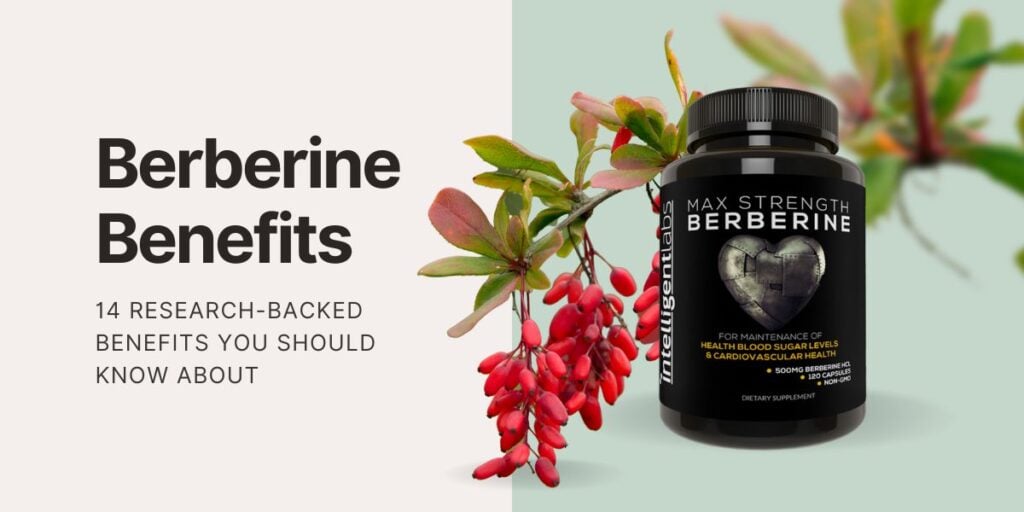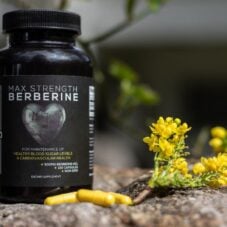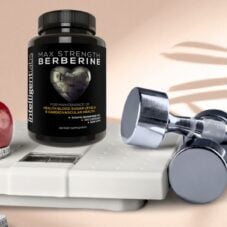Nutrition
14 Amazing Research-Backed Berberine Benefits!
The buzz is starting to get out about Berberine. There are not many supplements that have the ability to act as a ‘pharmaceutical drug’. Well, Berberine is one of them. In fact, many studies prove it’s just as effective as drugs like Metformin! It’s also safe with minor side effects and quite affordable, too. In this blog post, we’ll take a closer look at 14 Berberine benefits – all science-backed, of course!
Table of Contents
What is Berberine?
Berberine is an alkaloid compound that’s found in a number of different plants. Examples include Goldenseal, European barberry, Goldthread, Oregon grape, Tree Turmeric, and Phellodendron.
While the modern world is finally recognizing Berberine’s health benefits, its use in China and India goes back centuries. Early uses of Berberine were primarily for fighting infection and diarrhea. But as you’ll see below, modern science reveals it to be a highly versatile and very beneficial compound.
Here are 14 science-backed Berberine benefits!
Ready to get your mind blown at what Berberine can do for you and your health? Scroll down!
1. Berberine may help with weight loss
Efforts to create anti-obesity drugs are ongoing. No surprise there since the world’s population is growing ever fatter. However, there’s been little success. So, the search for the perfect anti-obesity pill is now focused on natural alternatives.
So, how does Berberine help with weight loss?
There are four ways:
First, is Berberine’s ability to activate AMPK (Adenosine MonoPhosphate-Activated Protein Kinase).
AMPK is like a metabolic master switch inside the body. It boosts fat burning by the mitochondria (the energy centers of cells in the body). When AMPK is activated, we naturally burn more energy.
Second, Berberine also seems to inhibit fat storage.
Third, it increases the efficiency of insulin, leptin, and adiponectin. These hormones play a significant part in weight gain and loss (1).
Fourth, Berberine may also be key in enhancing the activity of brown fat. It’s the type of fat that burns energy instead of storing it. It’s colored brown because it’s loaded with energy-burning mitochondria (2).
How Much Berberine To Take For Weight Loss?
We suggest taking 500mg of Berberine 3x a day with food, e.g. with breakfast, lunch, and dinner.
A 2012 study found that this exact dosage helped their subjects lose an average of 5 lbs. The subjects took the pills over 12 weeks with no other lifestyle changes. Moreover, researchers found that Berberine lowered triglycerides, improved cholesterol, and reduced inflammation (3).
When taking Berberine for weight loss, it’s also a good idea to combine it with healthy eating and exercise.
2. Berberine may help with PCOS
Improving insulin sensitivity is key for women suffering from PCOS (polycystic ovarian syndrome). When cells become insensitive to insulin, the body is forced to produce more insulin to get cells to accept glucose. This leads to increased insulin levels in the body, which tell the ovaries to produce excess testosterone.
Higher-than-normal testosterone isn’t good for ladies. This can have big implications on fertility. It can produce a range of androgenic symptoms, such as excessive hair growth and acne. It can also cause Acanthosis Nigricans; these are the dark and thick patches of skin that usually develop in the neck, armpit, and groin.
So, how does Berberine help with PCOS?
Berberine lowers insulin and blood glucose levels in a similar way to Metformin, which is often prescribed for PCOS. It helps the cells to absorb glucose at lower insulin levels, so the body doesn’t need to produce as much.
Berberine also prevents the digestion of carbohydrates in food, reduces glucose production in the liver, and reduces bad bacteria in the gut.
Most women suffering from PCOS have some level of chronic inflammation. Fortunately, Berberine also directly inhibits inflammatory pathways, including TNF alpha, interleukin-6, and COX2.
Berberine also reduces testosterone production in the theca cells of the ovaries (4) and helps reduce fat accumulation in the liver.
Berberine can also help women suffering from acne because testosterone excess is another facet of PCOS (5).
Compared to Metformin, taking Berberine for PCOS also has far fewer side effects.
Research on Berberine vs Metformin For PCOS
A 2011 study compared Berberine to Metformin for women with PCOS. The study used 500mg of Berberine 3 times a day. They found that both Berberine and Metformin improved insulin function, reduced body weight, and reduced testosterone production.
However, they found Berberine was superior to Metformin in reducing waist circumference, waist-to-hip ratio, blood triglycerides, as well as total and LDL cholesterol (the bad one), and increasing HDL cholesterol (the good one) (6).
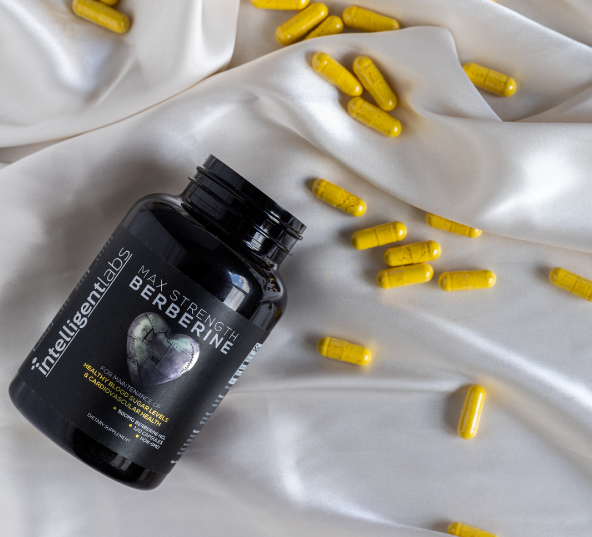
In another study, 150 infertile women with PCOS were given either Berberine or Metformin, three months prior to them starting IVF treatment. Both the Berberine and Metformin groups saw a reduction in insulin, blood glucose, and testosterone production. However, the Berberine group had a greater reduction in BMI. Most importantly, those who took Berberine had more live births and fewer GI side effects (7).
How Much Berberine to Take For PCOS?
Both of the studies mentioned above used 500mg of Berberine 3 times a day (taken with meals). But if you’re new to Berberine, you may take 2 x 500mg daily during the first week. This may help reduce the chance of GI side effects.
3. Berberine may help with diabetes
Berberine’s effect on diabetes is comparable to Metformin, but has significantly fewer side effects. As we’ve seen in the PCOS section, it can:
- reduce insulin levels
- decrease blood glucose levels
- increase insulin sensitivity
- reduce glucose production in the liver
Berberine can also decrease the amount of carbs digested. It can also help reduce bad bacteria in the gut and the chronic inflammation that is characteristic of diabetes.
Click here to know more about Berberine vs Metformin for diabetes. This article also contains specific dosage instructions.
4. Berberine may help reduce cholesterol and heart disease risk
Berberine has been shown to decrease blood cholesterol levels.
A recent review of 18 previous studies on Berberine and cholesterol showed that it can (8):
- Lower total cholesterol levels by 0.61 mmol/L (24 mg/dL)
- Reduce LDL-C (the bad cholesterol) levels by 0.65 mmol/L (25 mg/dL)
- Lower blood triglycerides levels by 0.50 mmol/L (44 mg/dL)
- Reduce heart disease risk and high blood pressure
- Raise HDL-C (the good cholesterol) by 0.05 mmol/L (2 mg/dL)
It’s also able to reduce apolipoprotein B by 13%-15% (9, 10). Apolipoprotein B levels are a key heart disease risk factor. It’s associated with the number of LDL particles in the blood.
Berberine also reduces insulin resistance and decreases blood sugar levels, which along with diabetes, are significant heart disease risks.
Moreover, Berberine stimulates the release of nitric oxide, a signaling molecule that relaxes arteries. Nitric oxide increases blood flow, lowers blood pressure, and protects against atherosclerosis (11).
How Much Berberine to Take To Lower Cholesterol?
Most studies on Berberine and cholesterol use the standard dose of 500mg, taken 3 times a day with meals. Total is 1500mg a day. Some studies though have used up to 3 grams a day.
We recommend starting with 500mg 3 times a day. With the potential to increase depending on tolerance and your doctor’s advice.
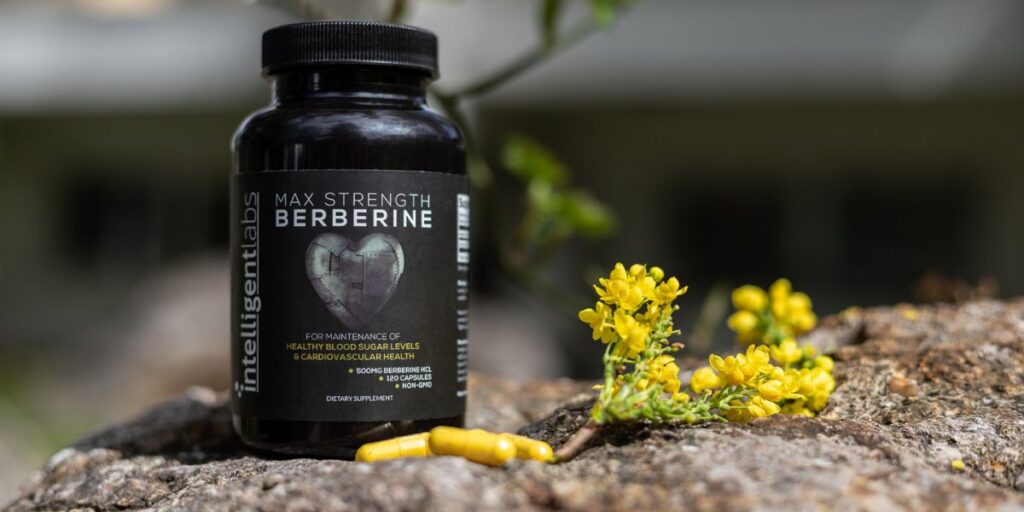
5. Berberine benefits may include helping get rid of Candida
Candida is a type of yeast found in our gut, skin, and mouth. Small amounts of Candida are necessary to help us digest our food. But an overgrowth can cause problems. It’s tricky to treat, too.
Candida overgrowth can cause a breakdown of our intestinal wall. This leads to the release of toxic byproducts into the body, known as “leaky gut”.
Its symptoms can range from fungal nail and skin infections to eczema, ADHD, depression, and anxiety. It may even make you crave carbohydrates. Tackling Candida should never just be left to one thing. It takes a multi-pronged attack to reverse Candida overgrowth.
However, Berberine is an excellent part of a Candida cleansing program. Berberine has fantastic anti-microbial activity and can:
- Increase the activity of more powerful antifungals like caprylic and undecylenic acid
- Kill other bad bacteria and parasites that may be contributing to Candida overgrowth
- Support the mucous membranes of the throat, digestive system, and vagina
- Support the immune system which will counteract the opposite effect of strong fungi
- Help support liver function and bile secretion
- Help the gut replenish good bacteria after a period of taking antibiotics
Berberine can also act specifically against Candida albicans. A 2011 study showed that Berberine could directly inhibit the growth of various Candida species. Its action also increased the effectiveness of antimycotics or antifungal drugs (12).
How Much Berberine To Take For Candida?
We recommend the standard dosage of 3 x 500mg Berberine capsules with meals per day.
6. Berberine may help with SIBO (small intestine bacterial overgrowth)
SIBO is an overgrowth of bacteria in the small intestine that can lead to abdominal pain, bloating, gas, and diarrhea. It may also lead to vitamin and mineral deficiencies and weight loss.
Current medical treatments focus mainly on antibiotic treatment. But antibiotics kill both good and bad bacteria. Berberine’s a good alternative for those who don’t want to take antibiotics, or haven’t had success with it.
Berberine’s actually effective against gram-positive bacterial strains which are predominant in the small intestine (13).
How Much Berberine to Take For SIBO?
We recommend the standard dosage of 3 x 500mg capsules of Berberine with meals per day.
7. Berberine may help with UTI and other infections
Berberine’s activity against bacteria, parasites, fungi, and viruses makes it an excellent treatment option for UTI and other infections.
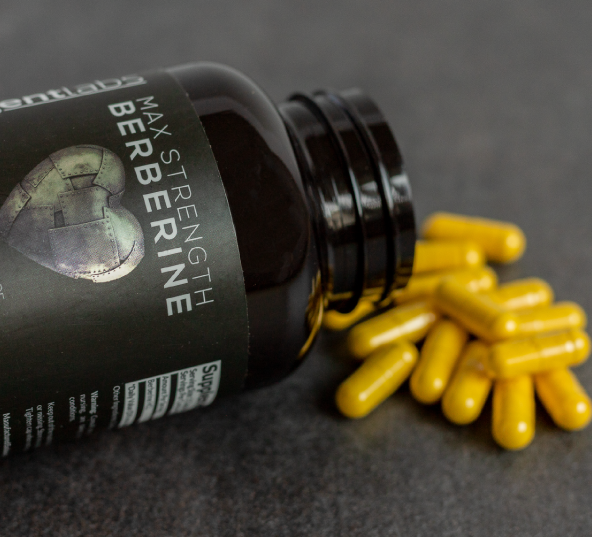
Berberine can significantly reduce the levels of ‘bad’ bacteria strains, such as Staphylococcus, Streptococcus, and Salmonella, Klebsiella, Clostridium and Shigella (14). Even more impressive is that when combined with antibiotics, Berberine may also help fight against MRSA (15).
Another infection that Berberine can help fight against is the flu virus (influenza) (16).
How Much Berberine To Take For Infections?
We recommend the standard dosage of 3 x 500mg Berberine capsules with meals per day.
8. Berberine’s benefits may include healing acne
Berberine has an anti-lipogenic effect on the sebaceous glands, so it can help people suffering from acne.
In cases of moderate to severe acne, a 600mg daily dose may help improve symptoms by as much as 45%. Acne symptoms were measured by counting non-inflamed, inflamed, and total acne lesions, as well as using Michaelson’s acne severity score (5).
Additionally, one of Berberine’s benefits is that may help speed up the healing of acne scars. It may also prevent future outbreaks of acne.
How Much Berberine To Take For Acne?
We suggest taking 500mg – 1000mg a day with meals. If your acne is a symptom of PCOS, take 500mg of Berberine 3 times a day with meals.
9. Berberine may help with Alzheimer’s
Berberine may also be able to slow the progression of, or even prevent, Alzheimer’s disease.
A 2015 study found that Berberine could enhance neuroprotective pathways and counteract neurodegeneration (17).
A 2011 study also concluded that “Berberine helps prevent oxidation damage to biomolecules in the brain, inhibits enzymes which break down important memory molecules, reduces peptides that interfere with proper memory function, and lowers lipids that interfere with cerebral blood flow” (18).
We eagerly await more research in this area. But so far, pharmaceutical drugs at best can only slow early-stage Alzheimer’s and dementia. So, Berberine is certainly worth a try.
How Much Berberine To Take For Alzheimer’s and Dementia?
We recommend the standard dosage of 3 x 500mg Berberine capsules with meals per day.
10. Berberine may help with depression
One of Berberine’s benefits is that it may be able to help with depression. So far, the research has only been conducted on mice and rats. But they’ve shown that Berberine increases the levels of Serotonin, Dopamine, and Norepinephrine in the brain (19, 20).
Also, inflammation has also been linked to the development of depressive symptoms. And because Berberine can reduce inflammation in the body, this may also be another mechanism through which it can fight depression.
11. Berberine may benefit lung health
Berberine is such a strong anti-inflammatory that it can also help acute lung inflammation caused by cigarette smoke.
A 2013 study gave mice 50mg/kg of Berberine, then induced acute lung injury with cigarette smoke. They found that pre-treating the mice with Berberine reduced lung inflammation (21).
12. Berberine may help with non-alcoholic fatty liver disease
Fatty Liver Disease is a risk factor for people suffering from type 2 diabetes and PCOS. People who are overweight, have high cholesterol, and high blood pressure are at risk, too.
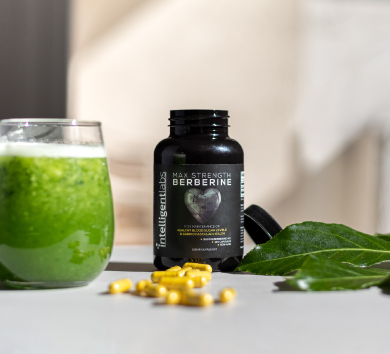
Current medications such as Metformin and Pioglitazone have limited success in treating the condition.
A more recent study in 2015 showed that Berberine improves fatty liver disease. Berberine can act on liver genes to help improve fat storage and fat burning in the liver (24).
Studies on Berberine, however, have been promising. It may improve liver function, increase fatty acid burning in the liver, decrease glucose production in the liver, and reduce fat build-up in the liver (22, 23).
How Much Berberine to Take For Fatty Liver Disease?
We recommend the same dosage as for type 2 diabetes of 3 x 500mg Berberine capsules with meals per day.
13. Berberine may help with arthritis and joint health
Berberine’s powerful anti-inflammatory properties could well benefit people suffering from rheumatoid arthritis and joint problems. It’s still early, but early studies have been promising!
For example, in animal models of rheumatoid arthritis, Berberine reduced arthritic scores and the immune response in rats (25). We eagerly await more studies!
How Much Berberine to Take For Arthritis and Joint Health?
We recommend the standard dosage of 3 x 500mg Berberine capsules with meals per day.
14. Berberine benefits include immunity support!
As we’ve seen, Berberine fights parasites, viruses, and fungi. It also helps rebalance the gut and reduce the number of bad bacteria (14).
Berberine can even fight against infection with superbugs like MRSA (15). All in all, it is an excellent supplement for boosting the immune system!
Where Can I Buy Berberine?
To order the highest quality Berberine available, just Click Here.
References
(1) Yang J, Yin J, Gao H, et al. Berberine improves insulin sensitivity by inhibiting fat store and adjusting adipokines profile in human preadipocytes and metabolic syndrome patients. Evid Based Complement Alternat Med. 2012;2012:363845. doi:10.1155/2012/363845
(2) Zhang Z, Zhang H, Li B, et al. Berberine activates thermogenesis in white and brown adipose tissue. Nat Commun. 2014;5:5493. Published 2014 Nov 25. doi:10.1038/ncomms6493
(3) Hu Y, Ehli EA, Kittelsrud J, et al. Lipid-lowering effect of berberine in human subjects and rats. Phytomedicine. 2012;19(10):861-867. doi:10.1016/j.phymed.2012.05.009
(4) Zhao L, Li W, Han F, et al. Berberine reduces insulin resistance induced by dexamethasone in theca cells in vitro. Fertil Steril. 2011;95(1):461-463. doi:10.1016/j.fertnstert.2010.07.1090
(5) Fouladi RF. Aqueous extract of dried fruit of Berberis vulgaris L. in acne vulgaris, a clinical trial. J Diet Suppl. 2012;9(4):253-261. doi:10.3109/19390211.2012.726702
(6) Wei W, Zhao H, Wang A, et al. A clinical study on the short-term effect of berberine in comparison to metformin on the metabolic characteristics of women with polycystic ovary syndrome. Eur J Endocrinol. 2012;166(1):99-105. doi:10.1530/EJE-11-0616
(7) An Y, Sun Z, Zhang Y, Liu B, Guan Y, Lu M. The use of berberine for women with polycystic ovary syndrome undergoing IVF treatment. Clin Endocrinol (Oxf). 2014;80(3):425-431. doi:10.1111/cen.12294
(8) Dong H, Zhao Y, Zhao L, Lu F. The effects of berberine on blood lipids: a systemic review and meta-analysis of randomized controlled trials. Planta Med. 2013;79(6):437-446. doi:10.1055/s-0032-1328321
(9) Shidfar F, Ebrahimi SS, Hosseini S, Heydari I, Shidfar S, Hajhassani G. The Effects of Berberis vulgaris Fruit Extract on Serum Lipoproteins, apoB, apoA-I, Homocysteine, Glycemic Control and Total Antioxidant Capacity in Type 2 Diabetic Patients. Iran J Pharm Res. 2012;11(2):643-652.
(10) Cicero AF, Rovati LC, Setnikar I. Eulipidemic effects of berberine administered alone or in combination with other natural cholesterol-lowering agents. A single-blind clinical investigation. Arzneimittelforschung. 2007;57(1):26-30. doi:10.1055/s-0031-1296582
(11) Cardiovascular and metabolic effects of Berberine, Flora Affuso, Valentina Mercurio, Valeria Fazio, and Serafino Fazio, World J Cardiol. 2010 Apr 26; 2(4): 71–77.
(12) Wei GX, Xu X, Wu CD. In vitro synergism between berberine and miconazole against planktonic and biofilm Candida cultures. Arch Oral Biol. 2011;56(6):565-572. doi:10.1016/j.archoralbio.2010.11.021
(13) Cernáková M, Kostálová D. Antimicrobial activity of berberine–a constituent of Mahonia aquifolium. Folia Microbiol (Praha). 2002;47(4):375-378. doi:10.1007/BF02818693
(14) Modulating gut microbiota as an anti-diabetic mechanism of berberine Junling Han, Huiling Lin and Weiping Huang, Med Sci Monit. 2011; 17(7): RA164–RA167.
(15) Chu, M., Zhang, Mb., Liu, Yc. et al. Role of Berberine in the Treatment of Methicillin-Resistant Staphylococcus aureus Infections. Sci Rep 6, 24748 (2016).
(16) Berberine Hampers Influenza A Replication through Inhibition of MAPK/ERK Pathway, Paweł Botwina, Katarzyna Owczarek et al. Viruses. 2020 Mar; 12(3): 344. Published online 2020 Mar 21.
(17) Jiang W, Li S, Li X. Therapeutic potential of berberine against neurodegenerative diseases. Sci China Life Sci. 2015;58(6):564-569. doi:10.1007/s11427-015-4829-0
(18) Berberine: A Potential Multipotent Natural Product to Combat Alzheimer’s Disease, Hong-Fang Ji, Liang Shen, Molecules 2011, 16(8), 6732-6740
(19) Kulkarni SK, Dhir A. On the mechanism of antidepressant-like action of berberine chloride. Eur J Pharmacol. 2008;589(1-3):163-172. doi:10.1016/j.ejphar.2008.05.043
(20) Peng WH, Lo KL, Lee YH, Hung TH, Lin YC. Berberine produces antidepressant-like effects in the forced swim test and in the tail suspension test in mice. Life Sci. 2007;81(11):933-938. doi:10.1016/j.lfs.2007.08.003
(21) Lin K, Liu S, Shen Y, Li Q. Berberine attenuates cigarette smoke-induced acute lung inflammation. Inflammation. 2013;36(5):1079-1086. doi:10.1007/s10753-013-9640-0
(22) Kim WS, Lee YS, Cha SH, et al. Berberine improves lipid dysregulation in obesity by controlling central and peripheral AMPK activity. Am J Physiol Endocrinol Metab. 2009;296(4):E812-E819. doi:10.1152/ajpendo.90710.2008
(23) Update on Berberine in Nonalcoholic Fatty Liver Disease, Yang Liu, Li Zhang, Haiyan Song and Guang Ji, Evid Based Complement Alternat Med. 2013; 2013: 308134.
(24) Berberine ameliorates nonalcoholic fatty liver disease by a global modulation of hepatic mRNA and lncRNA expression profiles, Xinlu Yuan, Jie Wang, Xiaoyan Tang, Yixue Li, Pu Xia and Xin Gao, J Transl Med. 2015; 13: 24. Published online 2015 Jan 27.
(25) Wang Z, Chen Z, Yang S, et al. Berberine ameliorates collagen-induced arthritis in rats associated with anti-inflammatory and anti-angiogenic effects. Inflammation. 2014;37(5):1789-1798. doi:10.1007/s10753-014-9909-y


